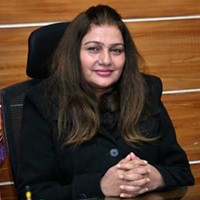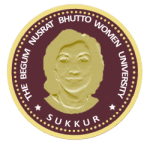
Dr. Razia Sultana
Biography
Prof. Dr. Razia Sultana, who is serving on second tenure as Vice-Chancellor in Shaheed Benazir Bhutto Women University which is Khyber Pakhtunkhwa's first women's university is a distinguished Historian and a well-known provincial resident. With distinction, she received her bachelor's and master's degree from Peshawar University and received a gold medal on the basis of her first-class history position. She was a professor in 1990 and obtained a Ph.D. in 1999 in the Department of History at Peshawar University. She graduated from center on International Cooperation New York University in History as a Full Bright Scholar in year 2002-2003. Despite her academic expertise, Professor Dr. Razia Sultana has fine administration experience in three discreet institutions, including Peshawar University, Quaid-i-Azam University Islamabad, and Shaheed Benazir Bhutto Women University Peshawar along with social welfare volunteer work. However, the administrative career served at different levels includes the following positions: Controller of examination, in-charge of Examination and Admission, and Resident Warden of Hostel. Also, before being Vice-Chancellor she has served in the Department of History in Quaid-i- Azam University Islamabad as Chairperson for six years. During her academic career at the department, she has successfully supervised 27 M. Phil and 13 Ph.D. scholars and in the present too, despite her demanding position, she is actively supervising M. Phil and Ph.D. scholars and resultantly supervised 16 Ph.D. theses. In addition, she honors a number of research articles - around 37 papers that have been published in different national and international publications. She held multiple conferences at both national and international levels and presented significant papers at several conferences. She has contributed as an Editor to the Pakistan Journal of Social Sciences, Quaid-i-Azam University, Islamabad, and is currently the Editor of FWU Journal of Social Sciences, SBBWUP. On the basis of her diverse experience, she is holding membership in various academic and professional bodies including as many as 32 local educational bodies and committees. Moreover, she performed social welfare roles of Vice-president of Council of Social Sciences (CSS), focal person of National Consortium of Social Sciences (HEC), joint secretary, General Secretary, and Vice President of Academic Staff Association. Furthermore, as Vice-Chancellor of SBBWUP, she is responsible for: operation and administration of multi-disciplinary faculties facilitating high-quality education, actively overseeing and monitoring University development; she is also catering to the additional charge of Dean of the University. Such multidimensional responsibilities are extended to her worthy self due to her resilient competencies. In short, she stands out as an outstanding Academician and Administrator who has brought the university to a distinguished position due to her proficient inspirational nature and hard work.
Abstract
Impact of Covid-19 on Students' Performance and Learning Ability
Uncertainty in many elements of national and international concern, particularly for educational institutes, has been introduced by the COVID-19 pandemic. Most importantly, there is ambiguity over the impact of Institutes closures on student’s learning ability last spring and how the swift transformation of most instruction to an online platform this academic year may further influence performance. Without information on the effects of the virus on learning, it is still difficult to decide informatively if and when to return to physical education and training. Even now, educational leaders need to wrestle with seemingly difficult options that balance the health dangers of learning in person with pupil's requirements for learning. Time under virtual education is tried to be best utilized and keep students engaged with the digital system yet many challenges leave us ambiguous. Many obstacles have arisen that include questions like: How to move from a physical classroom to a multi-panel zoom window? How to balance real-time teachings with asynchronous learning? Besides other obstacles like low network signals in distant areas, lack of resources to keep in touch with the updated modification in the system, lack of connectivity and collaboration. Also, group study, Field surveys, practical work, and interactions to invite debate for the sake of fruitful learning have stopped completely due to prevention from gatherings and mingling up. However, through difficult ways, the above challenges were met and students were kept engaged throughout the pandemic times. This virtual learning has altered the basic system considerably. As a result of online assessment and virtual learning, the aim of gathering results has changed big time as the aim is not to collect and deliver results data rather it changes to illustrate ways of enhancing the curriculum, teaching, and learning of students. Also, due to changes in teaching ways many universities and organizations have gathered resources to move courses online. Educational technology vendors have lowered financial commitments, and in some cases have decided to offer their technology free of charge at least until the end of the academic year. Thus, the pandemic has made a virtual assessment the last option to be functional with many
challenges in its way but the way forward is through amplifying its practice by training and collaborations. Also, the results yielding of the training need to be transferred to the concerned quarters for the optimum good of many.
